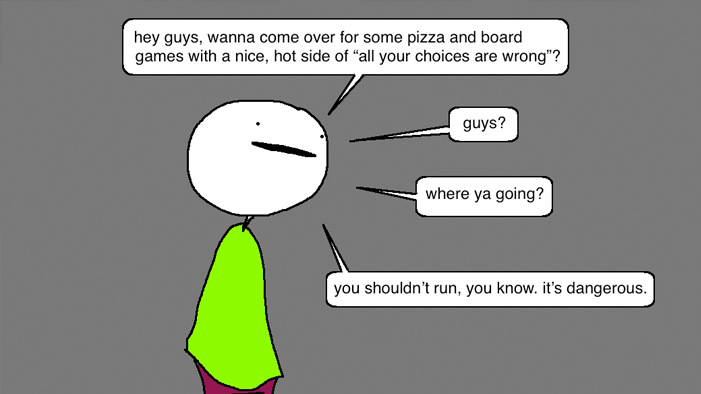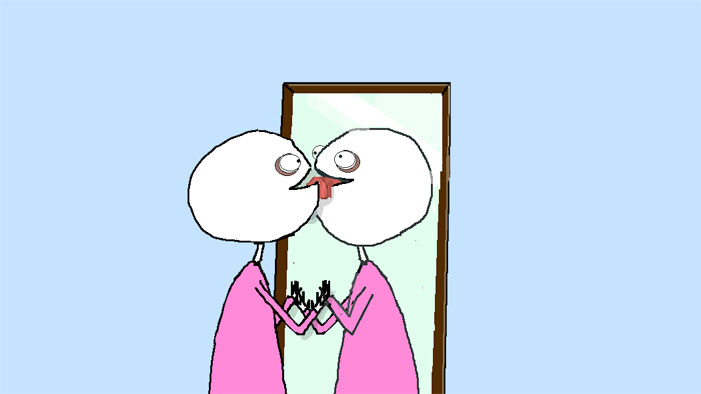Auntie SparkNotes: How Can I Help My Friends Realize Their Behavior Is Wrong?

Dear Auntie,
I live in a small town and go to a small school. Everyone knows everybody. My friends and I just started high school, and it seems like a whirlwind came through our moral compass. We all used to be respectful, and do what we were raised to do right. Lately though, most of my friends have started cussing, drinking, and gossiping, which has really made me worry.
For instance, at the beginning of the semester, we were allowed to read letters sent to us my our classmates who had already been through the class. I knew I’d get some advice that I could use. However, there was a letter read aloud to the class that said for me to, “Stop being a know-it-all and shut up. You aren’t the teacher, so you might learn something for once.” This really hurt, not just because of the mean words, but that this person (who I probably am “friends” with because we’re in AP classes) wouldn’t come and tell me to my face.
Most of all, I hate to see all these people that I’ve grown up with and care about do things that will hurt them for the rest of their life. I know so many people that I were once friends with that have started doing illegal drugs, and I’ve distanced myself from them because of this.
So my main question is, how can I tell my friends what they are doing is wrong and dangerous without seeming like a brown-noser and losing the friendship? I know I am not perfect, but I still think I can help.
Oh, this is awkward.
Because I know you do, honey. And I even believe that you mean well! But that honest and well-intentioned desire to “help” your peers by lecturing them about how to live their lives is, alas, the source of all your problems, because…well…because you’re wrong.
Not even morally, but factually. The truth is, you can’t help. The kind of meddling you want to do is very inherently unhelpful. And not only are you not helping, but you’re apparently alienating everyone around you and making them angry and crazy—to the point where your friends have resorted to writing you horrible, humiliating anonymous letters begging you to back the heck off. Which is incredibly hurtful, of course! And, uh, for the record, no matter how on-the-money the criticism might have been, it’s massively inappropriate for your teacher to allow something like that to be read aloud in class (said Auntie, as she brandished an extra-large salmon and shot meaningful looks at all the adults involved).
But as much as that situation really, truly sucked, it also makes it clear that you have a choice to make: you can keep haranguing people about the immorality of their behavior, or you can keep your friends. It’s one or the other. You cannot do both.
And if you’d prefer to keep your friends, then not only do you have to immediately and forever stop it with the holier-than-thou stuff, but you’ll probably need to apologize, too. I know that probably seems unfair to you when your friends are (gasp) experimenting with drugs (and more on that in a second), but acting like a judgmental scold is pretty much social kryptonite unless you can convince people that you’ve seen the error of your ways and aren’t going to do it again.
That said: I must also gently point out to you that most people mess around and do rebellious stuff on their way to adulthood, and it’s only in the rarest cases (and usually in combination with other issues) that it ruins their lives. Cussing, gossiping, and experimenting with illicit substances may not be fantastic behaviors, per se, but they are well within the range of normal things that teenagers do—and the vast, vast majority of people who do them turn out just fine.
Having a phase like this is in no way predictive of a lifetime of pain or delinquency. And I know this isn’t what you’re used to; like you said, “We all used to be respectful, and do what we were raised to do right.” But you’ve gotta realize, Sparkler, that you also all used to be children. Things change when you get older. It’s natural (and necessary!) for teenagers to abandon mindless rule-following in favor of boundary-pushing and experimentation, because you’re all starting to figure out who you are and what you want and where your values lie. It may not look like it, but your friends are actually doing the important work of learning how to be their own people.
Which is work you’re going to do, yourself, even if you end up starting a little later and don’t go about it quite the same way. But you can definitely expect your values, your desires, and your sense of self to evolve, too, in unexpected ways, as you draw closer to adulthood. And because you’ll want the freedom to do that—because having that freedom is vital to becoming whomever you’re going to be and pursuing a life’s that’s happy and fulfilling on your own terms—you’ll also want to take the opportunity now to let your friends live, even if you don’t love how they’re living.
Got something to say? Tell us in the comments! And to get advice from Auntie, email her at advice@sparknotes.com.
Want more info about how this column works? Check out the Auntie SparkNotes FAQ.














